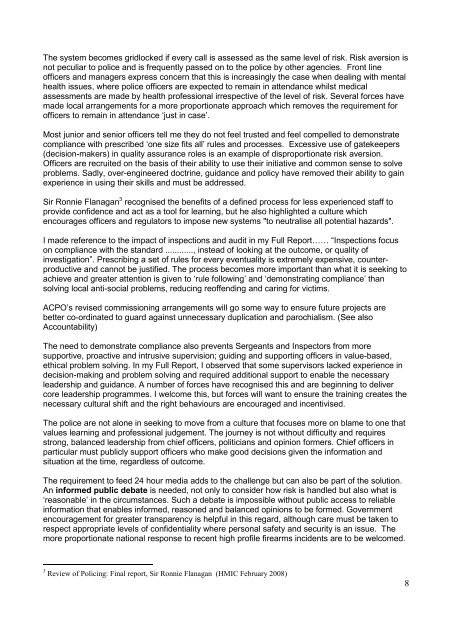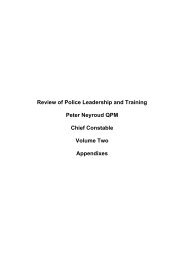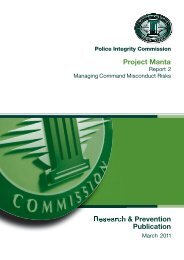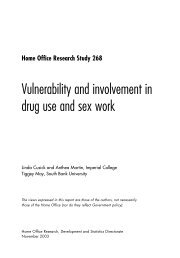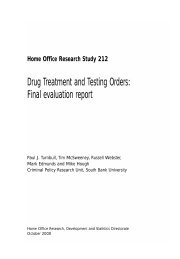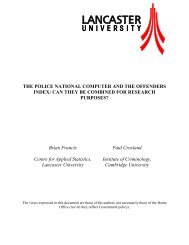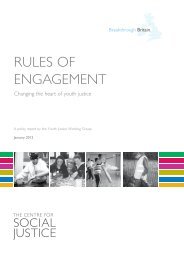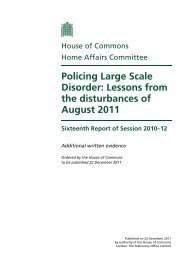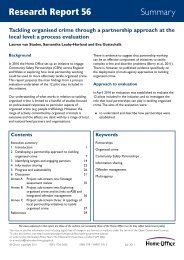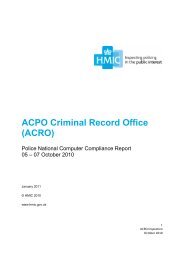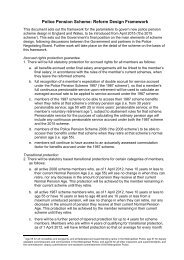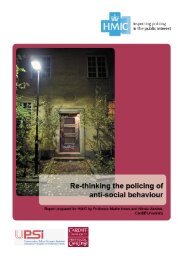Reducing Bureaucracy in Policing - Home Office
Reducing Bureaucracy in Policing - Home Office
Reducing Bureaucracy in Policing - Home Office
Create successful ePaper yourself
Turn your PDF publications into a flip-book with our unique Google optimized e-Paper software.
The system becomes gridlocked if every call is assessed as the same level of risk. Risk aversion is<br />
not peculiar to police and is frequently passed on to the police by other agencies. Front l<strong>in</strong>e<br />
officers and managers express concern that this is <strong>in</strong>creas<strong>in</strong>gly the case when deal<strong>in</strong>g with mental<br />
health issues, where police officers are expected to rema<strong>in</strong> <strong>in</strong> attendance whilst medical<br />
assessments are made by health professional irrespective of the level of risk. Several forces have<br />
made local arrangements for a more proportionate approach which removes the requirement for<br />
officers to rema<strong>in</strong> <strong>in</strong> attendance ‘just <strong>in</strong> case’.<br />
Most junior and senior officers tell me they do not feel trusted and feel compelled to demonstrate<br />
compliance with prescribed ‘one size fits all’ rules and processes. Excessive use of gatekeepers<br />
(decision-makers) <strong>in</strong> quality assurance roles is an example of disproportionate risk aversion.<br />
<strong>Office</strong>rs are recruited on the basis of their ability to use their <strong>in</strong>itiative and common sense to solve<br />
problems. Sadly, over-eng<strong>in</strong>eered doctr<strong>in</strong>e, guidance and policy have removed their ability to ga<strong>in</strong><br />
experience <strong>in</strong> us<strong>in</strong>g their skills and must be addressed.<br />
Sir Ronnie Flanagan 3 recognised the benefits of a def<strong>in</strong>ed process for less experienced staff to<br />
provide confidence and act as a tool for learn<strong>in</strong>g, but he also highlighted a culture which<br />
encourages officers and regulators to impose new systems "to neutralise all potential hazards".<br />
I made reference to the impact of <strong>in</strong>spections and audit <strong>in</strong> my Full Report…… “Inspections focus<br />
on compliance with the standard ............, <strong>in</strong>stead of look<strong>in</strong>g at the outcome, or quality of<br />
<strong>in</strong>vestigation”. Prescrib<strong>in</strong>g a set of rules for every eventuality is extremely expensive, counterproductive<br />
and cannot be justified. The process becomes more important than what it is seek<strong>in</strong>g to<br />
achieve and greater attention is given to ‘rule follow<strong>in</strong>g’ and ‘demonstrat<strong>in</strong>g compliance’ than<br />
solv<strong>in</strong>g local anti-social problems, reduc<strong>in</strong>g reoffend<strong>in</strong>g and car<strong>in</strong>g for victims.<br />
ACPO’s revised commission<strong>in</strong>g arrangements will go some way to ensure future projects are<br />
better co-ord<strong>in</strong>ated to guard aga<strong>in</strong>st unnecessary duplication and parochialism. (See also<br />
Accountability)<br />
The need to demonstrate compliance also prevents Sergeants and Inspectors from more<br />
supportive, proactive and <strong>in</strong>trusive supervision; guid<strong>in</strong>g and support<strong>in</strong>g officers <strong>in</strong> value-based,<br />
ethical problem solv<strong>in</strong>g. In my Full Report, I observed that some supervisors lacked experience <strong>in</strong><br />
decision-mak<strong>in</strong>g and problem solv<strong>in</strong>g and required additional support to enable the necessary<br />
leadership and guidance. A number of forces have recognised this and are beg<strong>in</strong>n<strong>in</strong>g to deliver<br />
core leadership programmes. I welcome this, but forces will want to ensure the tra<strong>in</strong><strong>in</strong>g creates the<br />
necessary cultural shift and the right behaviours are encouraged and <strong>in</strong>centivised.<br />
The police are not alone <strong>in</strong> seek<strong>in</strong>g to move from a culture that focuses more on blame to one that<br />
values learn<strong>in</strong>g and professional judgement. The journey is not without difficulty and requires<br />
strong, balanced leadership from chief officers, politicians and op<strong>in</strong>ion formers. Chief officers <strong>in</strong><br />
particular must publicly support officers who make good decisions given the <strong>in</strong>formation and<br />
situation at the time, regardless of outcome.<br />
The requirement to feed 24 hour media adds to the challenge but can also be part of the solution.<br />
An <strong>in</strong>formed public debate is needed, not only to consider how risk is handled but also what is<br />
‘reasonable’ <strong>in</strong> the circumstances. Such a debate is impossible without public access to reliable<br />
<strong>in</strong>formation that enables <strong>in</strong>formed, reasoned and balanced op<strong>in</strong>ions to be formed. Government<br />
encouragement for greater transparency is helpful <strong>in</strong> this regard, although care must be taken to<br />
respect appropriate levels of confidentiality where personal safety and security is an issue. The<br />
more proportionate national response to recent high profile firearms <strong>in</strong>cidents are to be welcomed.<br />
3 Review of Polic<strong>in</strong>g: F<strong>in</strong>al report, Sir Ronnie Flanagan (HMIC February 2008)<br />
8


